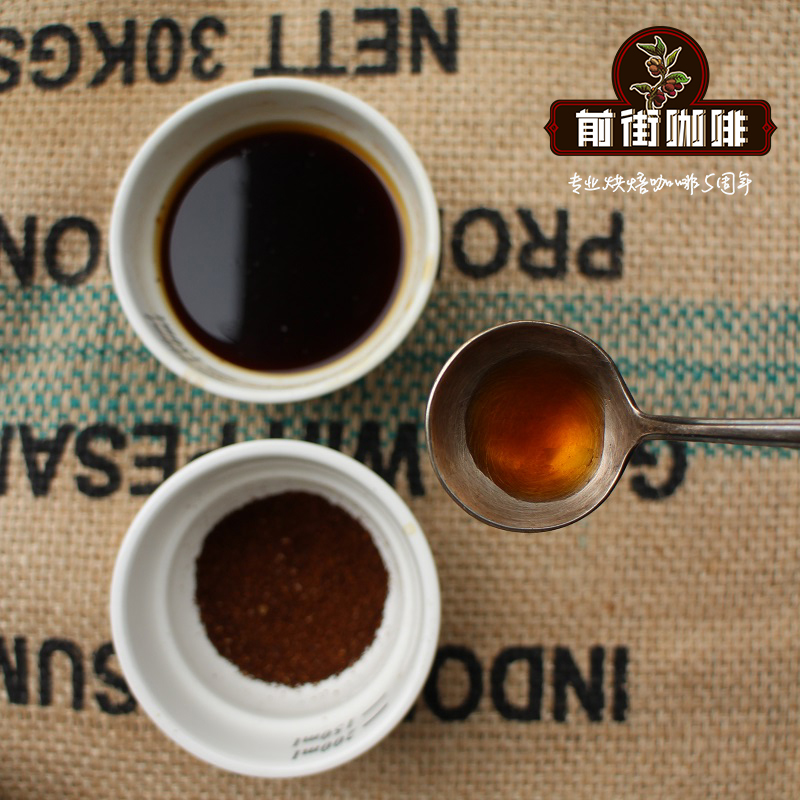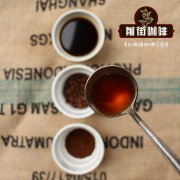Starbucks Decaf Coffee Is It Bad For You Decaf Coffee And Regular Coffee Advantages And Disadvantages Features Which Is Better

Professional coffee knowledge exchange more coffee bean information please follow the coffee workshop (Wechat official account cafe_style)
How are Starbucks' decaf beans cooked?
Drink coffee, natural. It's best! Neither decaffeinated coffee nor decaffeinated coffee is recommended. There are two ways to remove caffeine from ∼ Starbucks:
1. Direct contact method: first soften the green beans in warm water. Then add a chemical [methanol chloride], which has a very low melting point. It will be completely destroyed at 40 degrees. The temperature of brewing coffee is usually between 93 degrees. So Starbucks' decaffeinated beans don't contain methanol chloride.
After adding, release the caffeine from the coffee beans. This way can effectively preserve the flavor of coffee beans. The released caffeine can also be resold to drugmakers as painkillers or to beverage manufacturers to make beverages containing caffeine! The low-coffee beans sold by Starbucks are coffee beans with 99% caffeine!
two。 Swiss washing method: this way is to soak the green beans in warm water. Dilute the caffeine from the beans into the water. In separating the water from the coffee beans. At this time, the flavor and caffeine of the beans only went into the water. This kind of water is called flavor water. After that, the flavored water is filtered out of the caffeine with activated carbon. Soak the caffeine-filtered flavored water in the beans. Introduce the flavor of coffee beans in the water back to the beans. Reduce the loss of bean flavor! The content of caffeine in caffeine varies from variety to variety.
In the process of baking, the more caffeine is baked, the lower the caffeine content.
But. Here's the problem. Decaffeinated or even decaffeinated coffee is generally on the market. If it is handled in this way. What you drink. It will be coffee that only smells like coke or ashtray. So. Decaffeinated coffee or decaf coffee. After the raw beans are harvested, they are sent to the "pharmaceutical factory" to wash out the caffeine. Don't doubt it. That's what it is. Because some medications need to be made with caffeine. Pharmaceutical companies use this as a source of caffeine. Washed out in a pharmaceutical factory (this washing is chemical, not ordinary water washing)
The caffeine in coffee beans is dried and roasted to become decaffeinated or decaffeinated coffee. In fact, decaffeinated or decaffeinated coffee is mainly made for patients who cannot consume caffeine. Some people think that drinking decaffeinated or decaffeinated coffee is healthier, so they only choose these two kinds of coffee to drink. In fact, these two kinds of coffee are the most unhealthy. And usually after the washing process of the pharmaceutical factory, the flavor of coffee beans has left about 60% of the untreated beans of the same variety and origin, and the flavor has been destroyed by the washing process. So. Actually, coffee. It's natural. It's best to...
Are caffeine extraction techniques suspected of causing cancer?
At present, there are mainly three kinds of caffeine extraction techniques for low-caffeine beans, and solvent extraction is widely used, but it also causes the most discussion, because the residual amount of organic solvents is always worrying.
1 solvent extraction method
● dichloromethane extraction method | does not affect the flavor of coffee, but the solvent is a possible carcinogen
Raw coffee beans are treated with high-pressure steam, adjust the water content of coffee beans, and then soak in dichloromethane solvent, so that beans fully contact with the solvent to extract caffeine.
This extraction method is the most cost-effective method, because dichloromethane has the highest extraction efficiency of caffeine, is easy to volatilize, is not easy to remain, and has low reactivity with other substances.
However, dichloromethane is suspected to be a carcinogen and is harmful to the environment, and dichloromethane is currently banned from food processing in Taiwan; however, this practice is approved by the US Food and Drug Administration (FDA), setting only the allowable residue limit.
Su Nanwei mentioned that if you import decaffeinated coffee beans, it is still possible to buy coffee beans extracted with dichloromethane. But he further explained that the boiling point of dichloromethane is so low that it can be volatilized when heated to about 30 ∼ and 40 ℃, and it is not easy to remain; caffeinated coffee beans also go through the baking step at a temperature of about 160 ∼ 230 ℃, which can make dichloromethane completely volatile. Therefore, although the National Cancer Institute (National Cancer Institute) considers dichloromethane as a possible carcinogen, FDA still permits it, setting the upper limit of allowable residues for decaffeinated beans or instant coffee as a caffeine extraction solvent at 10ppm. While most decaffeinated beans are only about 1ppm, or even less, the risk of cancer is actually not high.
● ethyl acetate extraction method | safe and common, but slightly affect the flavor
Ethyl acetate is a new substitute due to consumers' misgivings about dichloromethane. Ethyl acetate exists in nature, and even the content of ethyl acetate in some fruits is higher than that of low-caffeinated coffee, which is considered to be a safer choice and a common practice at present.
The boiling point of ethyl acetate is slightly higher than that of dichloromethane, about 77 ℃, which is also easy to volatilize. The disadvantage is that ethyl acetate will affect the properties of coffee beans, and the flavor of roasted coffee beans is poor.
2 Swiss Water treatment method (Swiss Water) | safer but more expensive
No matter it is dichloromethane or ethyl acetate, there are doubts about residual organic solvents, so the "washing method" is developed. Making use of the water solubility of caffeine, soak the coffee beans in warm water, after caffeine and other ingredients are dissolved in the water, adsorb the caffeine in the extract with activated carbon, and then introduce the non-caffeinated extract back to the previous coffee beans. let the coffee beans reabsorb the lost ingredients, and then dehydrate and dry the coffee beans.
This approach emphasizes the use of no organic solvents to extract caffeine, making it a choice for healthy eaters. But the disadvantage is that even allowing coffee beans to reabsorb non-caffeinated extract will still affect the flavor of coffee beans; not only that, the low-caffeinated coffee produced by this method is also more expensive.
(3) Supercritical / liquid carbon dioxide high pressure extraction | expensive
There are a variety of decaffeinated procedures using high-pressure carbon dioxide, which can be used not only to remove caffeine from raw coffee beans, but also to remove caffeine from roasted coffee beans.
The main principle is that under the condition of specific high pressure and temperature, carbon dioxide has good penetration properties, and the flavor or specific components of coffee beans can be extracted according to demand. coupled with pressure, temperature control and the water content of carbon dioxide used for extraction, caffeine in coffee beans can be effectively separated.
In this way, there is no problem of solvent residue at all, and the original coffee flavor can be added back to the coffee bean by multi-stage extraction technology to retain the original flavor of coffee bean. But the problem is that because of the need for special equipment, the price is very expensive and not popular.
In fact, whether it is regular coffee or decaffeinated coffee, "moderate drinking" and "less cream and sugar" are still the biggest principles. However, if you have high cholesterol or belong to a group with a high risk of cardiovascular disease, it is best to discuss with your doctor and dietitian whether you are suitable for drinking decaf beans.
Qianjie coffee: Guangzhou bakery, the store is small but a variety of beans, you can find a variety of unknown beans, but also provide online store services. Https://shop104210103.taobao.com
Important Notice :
前街咖啡 FrontStreet Coffee has moved to new addredd:
FrontStreet Coffee Address: 315,Donghua East Road,GuangZhou
Tel:020 38364473
- Prev

Are the advantages and disadvantages of decaf harmful to health? how much is the price of decaf beans in Colombia?
Professional coffee knowledge exchange more coffee bean information Please pay attention to the coffee workshop (Wechat official account cafe_style) low-caffeinated coffee beans (DecafCoffee) are really healthier than ordinary coffee? University of Florida (UniversityofFlorida)
- Next

Blue Mountain Coffee | did you get the real thing? | how much is the price of authentic Blue Mountain Coffee
Professional coffee knowledge exchange more coffee bean information please follow the coffee workshop (Wechat official account cafe_style) Blue Mountain Coffee (Blue mountain) is probably the most famous single-origin coffee, and has a long history, it can be said that even if you have never tasted boutique coffee, you have heard of Blue Mountain Coffee. Why does it feel strange to apply the pig walking formula? (but I think I've really had it
Related
- Beginners will see the "Coffee pull flower" guide!
- What is the difference between ice blog purified milk and ordinary milk coffee?
- Why is the Philippines the largest producer of crops in Liberia?
- For coffee extraction, should the fine powder be retained?
- How does extracted espresso fill pressed powder? How much strength does it take to press the powder?
- How to make jasmine cold extract coffee? Is the jasmine + latte good?
- Will this little toy really make the coffee taste better? How does Lily Drip affect coffee extraction?
- Will the action of slapping the filter cup also affect coffee extraction?
- What's the difference between powder-to-water ratio and powder-to-liquid ratio?
- What is the Ethiopian local species? What does it have to do with Heirloom native species?

